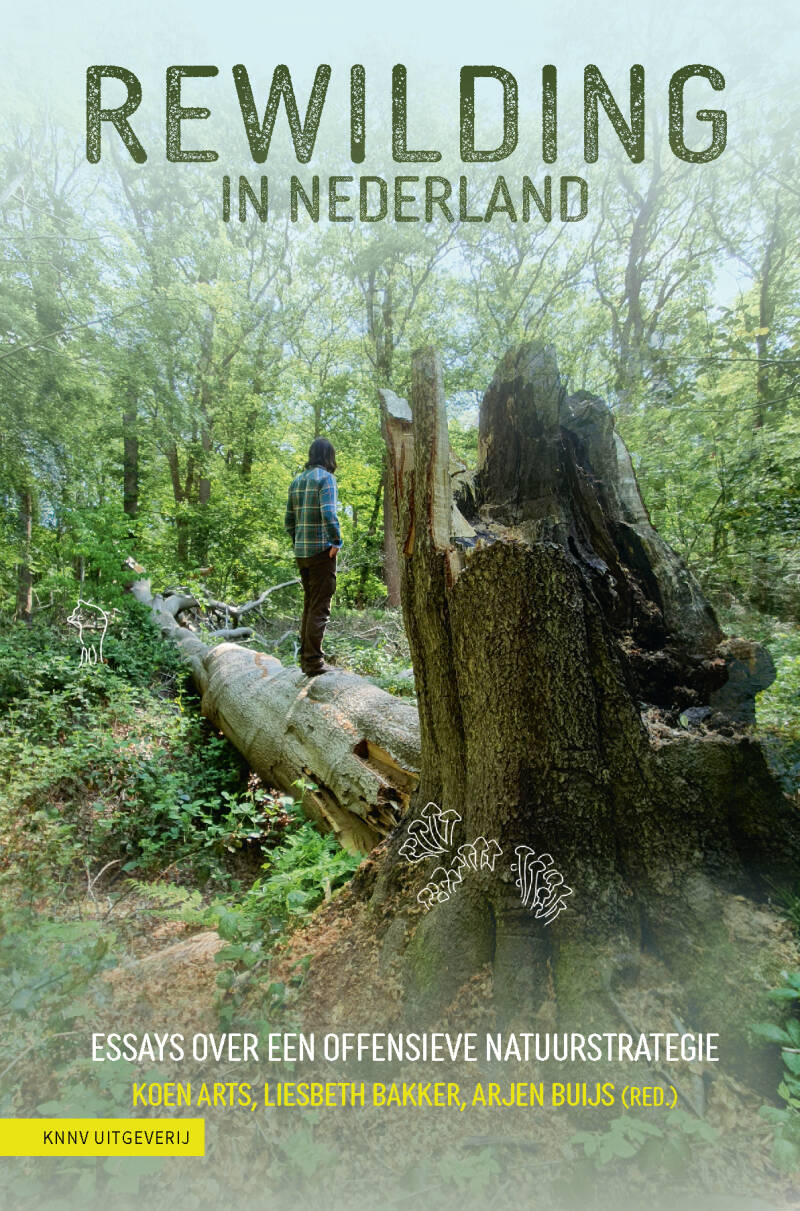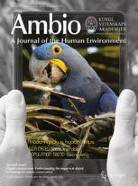Koen Arts is a Lecturer at the Forest and Nature Conservation Policy Group at Wageningen University in the Netherlands. He works on human dimensions of nature conservation, specifically human-environment interactions at a local and practical level. Topics of focus include:
- Local ecological knowledge and skill (in the context of livelihoods and recreation)
- Community-based conservation
- Human-wildlife interaction
- Human rewilding
- Outdoor relational learning and capacities for transformative change
He has also worked on digital conservation and (political) decision-making in nature conservation.
Koen usually adopts critical qualitative social science approaches, drawing from various (sub)disciplines such as political ecology, material anthropology, outdoor studies, eco-sociology, -psychology and -philosophy, and governance studies. He enjoys working in multidisciplinary settings, including cooperating with ecologists and conservation practitioners to further just and effective conservation.
He has worked in various places around the world, including India, Scotland and Brazil. Koen has authored >30 professional publications and his work features in prominent journals in the field (see selected publications below). He has co-edited an Ambio Special Issue on Digital Conservation, and the first Dutch book on rewilding, Rewilding in Nederland.
He gives frequent presentations for peers, policy makers, practitioners and general audiences, and has peer-reviewed >70 articles for >30 different scientific journals. He is associate editor for the British Ecological Society's journal People and Nature.
Koen coordinates the MSc course Communities, Conservation, Controversies (FNP31306). In 2021 he set up the new WUR course Anthropology of outdoor skill: Combining theory and practice through relational learning (FNP51306). This course won the WUR Excellent Education Award in the category Special Courses in 2023. In 2024 a sequel to this course was established: Anthropology of outdoor skill 2: The journey.
He supervises 5-10 BSc and MSc thesis students every year and is co-promotor of:
- Reineke van Tol's PhD project 'Wilding pedagogies: Exploring relational learning and inner transformation for youth’s being and becoming with(in) a liquid world'.
- Ravi van de Port's PhD project 'Exploring the social dimensions of rewilding and associated human-nature relations'.
- Wu Ge's PhD project 'Diversity within: the becoming, growth, and practice of nature-based educators in China'.
Together with colleagues, Koen organised a PhD summer school 'Human-Nature Relationships for Transformative Change in 2024.
Koen is also the chair of the Programme Committee for the BSc and MSc programmes Forest and Nature Conservation, and the education coordinator for his chair group.
Academic biography
2015- Lecturer Forest and Nature Conservation Policy Group, Wageningen University, the Netherlands.
2015-2016 Postdoc research Fellowship (Science without borders, CNPq) 'Digital conservation in the Pantanal: Developing new political ecology perspectives on digital applications in natural resource conservation'. Pantanal Research Centre, Federal University of Mato Grosso, Cuiabá, Brazil.
2012-2014 Postdoc research Fellowship Natural Resource Conservation group, dot.rural, University of Aberdeen, United Kingdom.
2008-2012 PhD in Biological Sciences (passed with no corrections required), University of Aberdeen and The James Hutton Institute, United Kingdom. Supervisors: Prof. Anke Fischer and Prof. René van der Wal. External examiner: Prof. Bill Adams, University of Cambridge.
2002-2008 BA and MA (cum laude) in Philosophy. Specialisation: social and political philosophy. Radboud University Nijmegen, the Netherlands.
2003-2005 Interdisciplinary Honours Programme Certificate, extracurricular evening programme. Specialisation: theory of literature. Radboud University Nijmegen, the Netherlands.
2001-2007 BSc and MSc (cum laude) in Forest and Nature Conservation. Specialisation: policy and management. Wageningen University, the Netherlands.
Book / Special Issue
Articles (selection)
- Arts K, Roncken P, Buijs A, Wals A. 2025. Embedding outdoor relational education in academia: Perceived barriers and opportunities at a Dutch university. Australian Journal of Environmental Education. https://doi.org/10.1017/aee.2025.24 [Open Access]
- Lam T, Arts K. 2024. Imagining rural landscapes: Making sense of a contemporary landscape identity complex in the Netherlands. Environmental Values, 34(1), 60-83. https://doi.org/10.1177/09632719241289505 [Open access via https://edepot.wur.nl/676372.]
- Kort R, Arts K, Antó J et al. 2023. Outcomes from the First European Planetary Health Congress at ARTIS, Amsterdam. Challenges, 14(4), 49; https://doi.org/10.3390/challe14040049 [Open Access]
- Arts K. 2023. De noodzaak van menselijke rewilding. Waardenwerk (Journal of Humanistic Studies), 23 (92), 65-70. https://doi.org/10.36254/WW.2023.92.05 [Behind journal paywall]
-
Maffey G and Arts K. 2023. Human rewilding: Practical pointers to address a root cause of global
environmental crises. Chapter 35 in: Routledge Handbook for Rewilding. Hawkins, Convery, Carver, Beyers (eds), Routledge, pp 374-382. Download here
- Arts K, Mattijssen T, Wiersum K. 2022. Dynamics of community forestry in the Netherlands: Impacts of changing cultural ecological knowledge. Chapter 32 in: Routledge Handbook of Community Forestry. Bulkan J, Palmer J, Larson A, Hobley, M (eds), Routledge (Earthscan), Oxon. pp: 523-537. Download here
- Arts K, Bakker L, Buijs A (editors) 2022. Rewilding in Nederland: Essays over een offensieve natuurstrategie, KNNV Uitgeverij. 248 p., ISBN 978 90 5011 869 9. Verkrijgbaar in de meeste (online) boekhandels en hier gratis te downloaden. Hoofdstukken als (co-)auteur:
- Arts K, Bakker L, Buijs A. 2022. Introductie: Rewilding in Nederland – tussen hoop en vrees, pragmatisme en idealisme. In: Rewilding in Nederland. Essays. Arts, Bakker, Buijs (eds) Zeist, KNNV Uitgeverij, pp: 9-21.
- Arts K and Maffey G. 2022. Menselijke rewilding. In: Rewilding in Nederland. Essays. Arts, Bakker, Buijs (eds) Zeist, KNNV Uitgeverij, pp. 73-81.
-
Bakker L, Buijs A, Arts K 2022. Synthese: Rewilding als offensieve strategie. In: Rewilding in Nederland. Essays. Arts, Bakker, Buijs (eds) Zeist, KNNV Uitgeverij, pp. 211-222.
- Ploos van Amstel N, Rakotondrainy R, Castellano M, Arts K. 2022. Tortoise panopticon: Linkages between taboos and conservation management in Madagascar. Geoforum, 129, 85-97. https://doi.org/10.1016/j.geoforum.2021.10.013 [Open Access]
- Klein L and Arts K. 2021. Public participation in decision-making on conservation translocations: The importance and limitations of a legislative framework. Restoration Ecology. https://doi.org/10.1111/rec.13505 [Open Access]
- Arts K, Melero Y, Webster G, Sharma N, Tintarev N, Tait E, Mellish C, Sripada S, MacMaster A, Sutherland H, Horrill C, Lambin X, Van der Wal R. 2020. On the merits and pitfalls of introducing a digital platform to aid conservation management: Volunteer data submission and the mediating role of volunteer coordinators. Journal of Environmental Management, 265. https://doi.org/10.1016/j.jenvman.2020.110497 Download here
- Dekker L, Arts K, Turnhout E. 2020. From rationalities to practices: Understanding unintended consequences of CBNRM. Conservation and Society, 18(2), 137-147. https://journals.lww.com/coas/fulltext/2020/18020/from_rationalities_to_practices__understanding.7.aspx [Open Access]
- Arts K, Macleod C, Ioris A, Han X, Sripada S, Braga J, Maffey G, Jekjantuk N, Zeng C, Van der Wal R. 2019. Towards more effective online environmental information provision through tailored natural language generation: Profiles of Scottish river user groups and an evaluative experiment. Science of the Total Environment, 673, 643-655. https://doi.org/10.1016/j.scitotenv.2019.03.440 [Open Access]
- Mooij M, Mendonça S, Arts K. 2018. Conserving biocultural diversity through community-government interaction: A practice-based approach in a Brazilian extractive reserve. Sustainability (Special Issue on Biocultural Diversity and Sustainability), 11 (1), 32. https://doi.org/10.3390/su11010032 [Open Access]
- Arts K, Rabelo M, Figueiredo D, Maffey G, Ioris A, Girard P. 2018. Online and offline representations of biocultural diversity: A political ecology perspective on nature-based tourism and indigenous communities in the Brazilian Pantanal. Sustainability (Special Issue on Biocultural Diversity and Sustainability), 10 (10), 3643. https://doi.org/10.3390/su10103643 [Open Access]
- Arts K, Fischer A, Van der Wal R. 2016. Boundaries of the wolf and the wild: A conceptual examination of the relationship between rewilding and animal reintroduction. Restoration Ecology, 24 (1), 27-34. http://dx.doi.org/10.1111/rec.12309 Download here
- Arts K, Ioris A, Macleod CJ, Han X, Sripada SG, Braga JF, Van der Wal R. 2016. Environmental communication in the Information Age: Institutional barriers and opportunities in the provision of river data to the general public. Environmental Science and Policy, 55 (1), 47-53. http://dx.doi.org/10.1016/j.envsci.2015.08.011 [Open Access]
- Arts K, Van der Wal R, Adams WM. 2015. Digital technology and the conservation of nature. Ambio, 44 (Suppl. 4), 661-673. http://dx.doi.org/10.1007/s13280-015-0705-1 [Open Access]
- Maffey G, Homans H, Banks K, Arts K. 2015. Digital technology and human development: A charter for conservation. Ambio, 44 (Suppl. 4), 527-537. http://dx.doi.org/10.1007/s13280-015-0703-3 [Open Access]
- Van der Wal R, Arts K. 2015. Digital Conservation: An introduction. Ambio, 44 (Suppl. 4), 517-521. http://dx.doi.org/10.1007/s13280-015-0701-5 [Open Access]
- Arts K, Ioris A, Macleod C, Han X, Sripada Y, Braga J, Van der Wal R. 2015. Supply of online environmental information to unknown demand: The importance of interpretation and liability related to a national network of river level data. Scottish Geographical Journal, 131 (3-4: The Rural Digital Economy), 245-252. http://dx.doi.org/10.1080/14702541.2014.978809 [Open Access]
- Arts K, Fischer A, Van der Wal R. 2014. Political decision-making, governance shifts and Scottish animals reintroductions: Are democratic principles at stake? Journal of Environmental Planning and Management, 57 (4), 612-628. http://dx.doi.org/10.1080/09640568.2012.758627 [Behind journal paywall]
- Arts K, Webster G, Sharma N, Melero Y, Mellish C, Lambin X, Van der Wal R. 2013. Capturing mink and data: Interacting with a small and dispersed environmental initiative over the introduction of digital innovation. Framework for Responsible Research and Innovation in ICT. [Open Access: Download here]
- Arts K and Maffey G. 2013. Trump’s golf course - society’s nature: The death and resurrection of nature conservation. ECOS, 34 (1), 49-58. https://www.ecos.org.uk/wp-content/uploads/2015/03/ECOS-34-1-49-Trumps-golf-course.pdf [Open Access]
- Arts K, Fischer A, Van der Wal R. 2012. Reintroducing charismatic species to Scotland: The rhetoric and politics of a 21st century agenda. ECOS, 33 (3/4), 61-67. https://www.ecos.org.uk/wp-content/uploads/2015/05/ECOS-33-3-4-61-Reintroducing-charismatic-species-to-Scotland.pdf [Open Access]
- Arts K, Fischer A, Van der Wal R. 2012. Common stories of reintroduction: A discourse analysis of documents supporting animal reintroductions to Scotland. Land Use Policy, 29 (4), 911-920. http://dx.doi.org/10.1016/j.landusepol.2012.01.009 [Behind journal paywall]
- Arts K, Fischer A, Van der Wal R. 2012. The promise of wilderness between paradise and hell: A cultural-historical exploration of a Dutch national park. Landscape Research, 37 (3), 239-256. http://dx.doi.org/10.1080/01426397.2011.589896 [Behind journal paywall]

